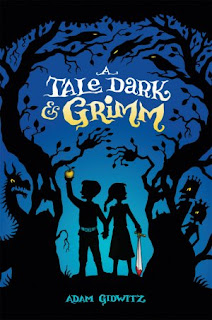Sunday, April 15, 2012
A Tale Dark & Grimm by Adam Gidwitz
Once Upon A Time…
How many stories begin with this familiar line? Typically, it is associated with fairy tales
and that is sort of what you get
with this enchanting tale by Adam Gidwitz.
Gidwitz reworks the familiar tale of Hansel and Gretel in addition to several other fairy tales by the Brothers Grimm. Readers are introduced to Hansel and Gretel
by first meeting their famous King and Queen parents, who also have a very
storied past. The book is a journey
through the young lives of Hansel and Gretel, filled with adventure of the
familiar kind (think house made of cake with an old woman who tries to eat the
famous pair) to a separation of the siblings with their own subsequent trials
and tribulations (think a tortuous trip to hell and an unpleasant time spent with
a handsome cannibal), to a reunion that finds the pair battling an evil dragon
who has a more personal relationship with the two than they first realize. A narrative voice accompanies the text,
directly warning readers to read on only if they can handle the bloody, gory
details ahead and advising against reading the stories aloud to youngsters who might react badly to them. The narrative
voice also, at times, questions the actions of Hansel and Gretel and begs of
the reader whether the pair are making the right decisions, while reminding the
reader that of course, what kind of story would it have made if there were not
some of the decisions involved that the pair make.
The book is geared towards readers at the age of 10 or
older, and it likely would be more appealing towards the younger, middle age
set than a high school set of readers, although the older age group might be
able to make more analytical connections between the Grimm Fairytales and also identify the twists to each one that Gidwitz applies to the originals. In that regard, this novel would be a great
teaching tool to use. The novel was on
the 2012 list of quick reads for reluctant readers and would be an excellent choice for reluctant readers as the novel is very
engaging, and the narrative voice edges readers forward, almost by using
reverse psychology by telling readers they might want to put the book
down as they might not be able to properly handle what is coming in the pages ahead.
The novel would be important for teens to read if teachers
are trying to introduce the Grimm fairytales to students or if they are doing a
short story unit. The novel is an easy text
to use before moving on to more challenging texts. In addition, many great discussions could be
had based on all of the experiences, difficult decisions and tribulations that Hansel and Gretel encounter. Hansel and Gretel are faced with a lot of
life lessons throughout their journey and the “moral of the story” that occurs in each mini-story/chapter throughout the novel would make for a
lot of connections that students can make to their own lives or to society. This could also facilitate lively in class discussions, or self-reflective journal entries, among
other activities, in teaching the novel.
Subscribe to:
Post Comments (Atom)

3 comments:
Nicole, this quick read sounds great. Unfortunately, for all the blood and gory details, I for one cannot read such a book, even though it does sound like an excellent read. I understand that students at 10 years old might be interested in this kind of read, nevertheless, I don't think they'd understand the story. I think to them, they would be more focused on the action (blood), but not the connections, etc. That is why I do agree that older students might have a better time with this book because they will understand it more than just through its actions.
I am always a fan of uniquely reworked fairytales, and this book sounds like it plays into that genre quite well. I even like the play on the word Grimm in the title. From what it sounds like to me, this book seems more geared toward the middle school set than the older crowd, like you said in your review. Students do often participate in a fairytale unit in grade school and might be able to make those comparisons/connections, that you mention, to the original tales. (If I am not mistaken, this book was book talked to either soon to be 5th or 6th graders at the library where I work, and the librarian that plans those is usually dead on with her age-group recommendations.) This book sounds fun and the narrative choice sounds like really would make the reader want to keep going. I think I may want to dive into a Tale Dark and Grimm.
I should have clarified more in the review that the book isn't actually all that bloody and gory. It is more of the narrator goading the reader on by saying there would be blood and guts ahead. A finger does get cut off and as many know from the usual tale, a woman gets cooked in the oven, and other things like that happen, but the author doesn't go into really specific details about it. But, everyone reacts differently so I understand that some might not want to read it.
I am glad that I had the age group targeted pretty well Demitra! I think middle school aged students might get a kick out of reading this novel and seeing how stories can be reworked.
Post a Comment